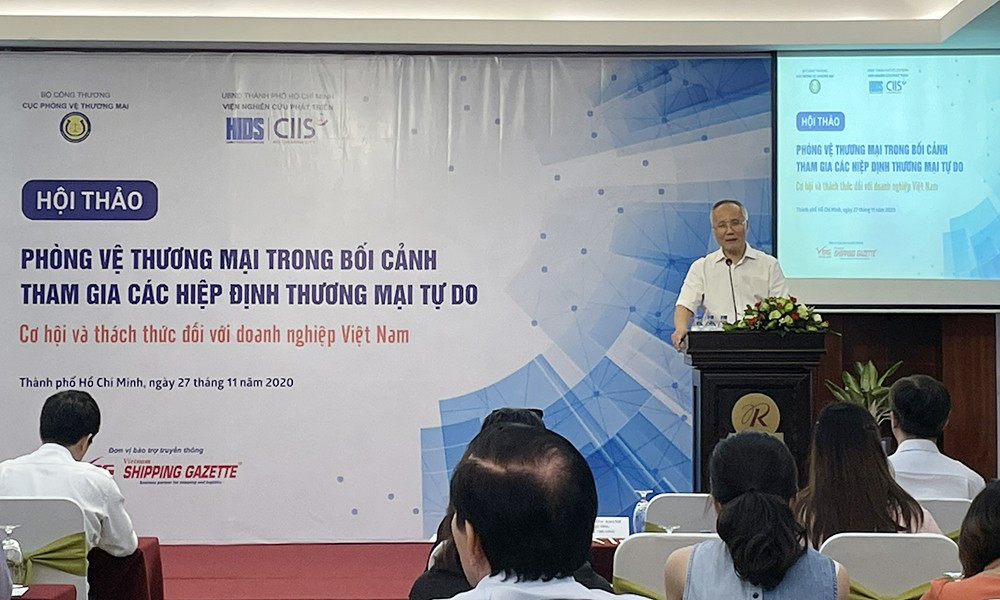Trade defense in the context of joining FTAS
Thời sự - Logistics - Ngày đăng : 14:33, 10/12/2020

Deputy Minister of Industry and Trade Tran Quoc Khanh giving opening speech at the Conference

Deputy Minister of Industry and Trade Tran Quoc Khanh giving opening speech at the Conference
THE INFLUENCE OF FTAS ON VIETNAM’S ECONOMY
In 2000, Vietnam signed a Trade Agreement with the United States; in 2006, Vietnam became a member of the World Trade Organization (WTO); and if AFTA (now called ATIGA) is included, we have entered into a total of 14 free trade agreements (FTAs), both bilateral and multilateral.
At the Workshop “Trade defense in the context of participating in free trade agreements: Opportunities and challenges for Vietnamese enterprises” taken place on November 27, 2020 in Ho Chi Minh City by HCMC Center for International Integration in coordination with the Trade Remedies Authority of Vietnam (TRAV), the Ministry of Industry and Trade; Deputy Minister of Industry and Trade, Mr. Tran Quoc Khanh shared: “If the import-export turnover of Vietnam in 2001 (when signing the Bilateral Trade Agreement between Vietnam and the United States reached more than USD 30 billion, after 6 years, in 2007 (when joining WTO), this figure was USD 100 billion; by 2011 it reached USD 200 billion and by 2019 this figure was USD 517 billion. Over the same period, exports have grown from USD 15 billion in 2001 to nearly USD 50 billion in 2007, nearly USD 100 billion in 2011, and are expected to reach USD 270 billion this year. With this result, Vietnam has become the 22nd largest export economy in the world”.
In the process of international economic integration, as the monitoring report of the National Assembly pointed out, the FTAs have contributed to fundamentally changing economic institutions in particular and the economy of Vietnam in general. Over the years, the scale of Vietnam’s exports has increased many times, showing that the capacity of many manufacturing industries and exports of Vietnam has been higher, our goods have penetrated with fair competition in many export markets. However, imported goods are also entering more and competing fiercely with the domestic market.
To ensure an environment of equal competition between imported and domestically produced goods in the context of opening up the economy and making commitments on eliminating tax barriers and non-tariff barriers, negotiators of previous WTO members’ negotiations, or the current FTAs, have designed a tool called trade defense. Trade defense is the inevitable consequence of the countries opening their markets. In order to proactively respond and minimize adverse effects, enterprisses need to firmly grasp the trade defense regulations in FTAs, and have a comprehensive and profound awareness of trade defense tools in hand.
THE IMPACT OF TRADE DEFENSE ON VIETNAM’S EXPORTED GOODS
Currently, trade defense measures including anti-dumping, anti-subsidy and self-defense are being chosen by many countries around the world to protect domestic production. According to WTO statistics, in the last 25 years since the WTO was born, countries have initiated an investigation of a total of 5,944 anti-dumping cases, 577 anti-subsidy cases and 377 self-defense cases, an average of more than 270 per year.
In recent years, the number of foreign trade defense cases against Vietnam’s exported goods is increasing rapidly. If in the period 2005-2010 there were 21 cases, the number in the period from 2016 to November 2020 was 99 cases. In particular, the number of anti-evasion cases targeting Vietnamese exports is showing signs of increasing because some countries believe that goods exported from Vietnam use the main raw materials imported from regions that trade defense measures are applied (such as steel, aluminum,...).
The main reason for the increasing trend of trade defense cases against Vietnamese exported goods is the rapid growth of Vietnam’s exports, thanks to the positive impacts of the process of international economic integration and participation in FTAs. Many Vietnamese products have created a great pressure of competition in the importing country market, causing the manufacturing industries in these countries to request their Government to investigate and apply trade defense measures.
Trade defense is a relatively new content for Vietnam, but in recent years, Vietnam has started to use trade defense tools to establish a fair competitive environment and protect legitimate interests of the domestic manufacturing industry. As of November 2020, the Ministry of Industry and Trade has initiated an investigation of 21 trade defense cases, including 13 anti-dumping cases, 1 anti-subsidy case, 06 self- defense cases and 01 anti-evasion case. Self defence. In which, the Ministry of Industry and Trade issued the Decision on applying 07 anti- dumping measures, 05 safeguard measures and 01 anti-evasion self- defense measure. These measures have contributed to re-establishing a fair competitive environment and protecting legitimate interests of many domestic manufacturing industries.
Trade defense measure is to protect a manufacturing industry, not just a specific enterprise or group of businesses. Therefore, investigating agencies need to have full information from all relevant sectors in the manufacturing industry (exporters, importers, suppliers, consumers,...) in order to make the most objective decisions and accurate assessment of the case. However, at present, most businesses do not provide sufficient information, delay in delivering information, or just “call for help” after the authorities finish the investigation process and make the final conclusion.
According to Ms. Phan Mai Quynh, Deputy Head of Damage Investigation and Self-Defense Department of the TRAV: “In order for management agencies to be able to support enterprises in the most optimal way in trade defense cases, enterprises need to proactively equip with basic knowledge of trade defense laws, trade defense regulations in FTAs between Vietnam and partners, to understand their obligations and interests, production and export enterprises need to participate fully, responsibly and closely coordinate with the TRAV to ensure the best of their interests. In addition, enterprises need to regularly and promptly communicate with the Ministry of Industry and Trade, so that State management agencies can promptly advise and ensure stable and sustainable development’
